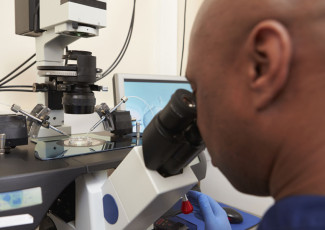Connecting Students to In-Demand Jobs
By Rebecca L. Weber
September 25, 2015
After an initial spring success, Lorain County Community College ramps up a pilot program.
Several community colleges in Ohio are launching programs in response to students’ needs. Right Skills Now (RSN) at Lorain County Community College (LCCC) is a skills-based job-training program that connects students to in-demand jobs.
Northeast Ohio is a strong manufacturing region with lots of big players, such as U.S. Steel, Ford and Whirlpool, as well as many small and medium-sized companies in the supply chain. RSN students earn manufacturing skills certificates that are widely recognized and used by employers as part of their hiring decisions: options include a National Career Readiness Certificate, as well as NIMS certificates in areas such as Measurement, Materials and Safety, or CNC Operator Milling.
To develop RSN, LCCC worked with a group of manufacturers who faced challenges with skills shortages among the pool of applicants. Together, they identified and cultivated a cohort of students who went through a full-time, 10-week training curriculum. The program’s design prepares students to sit for a skills certification test and then do a paid eight-week internship.
The pilot program last spring was “highly successful,” according to LCCC President Roy Church, and demonstrated that it can work for a group of disparate employers, especially for small and medium- sized businesses that have only one or two openings.
Employers meet with job candidates who have earned college credits, acquired certificates and gained work experience, Church says. “They haven’t guaranteed a job,” he says. “They’ve guaranteed an interview. Students have gone through background checks, so they should be very hirable.”
Seven out of 10 students completed the pilot program. Of those seven — three women and four men — all are now employed.
This fall, LCCC plans to run two more sessions. One will be full time; the other will be part time, to accommodate students who already have jobs and want to upgrade their skills.
“We’re much more successful in recruiting students into manufacturing preparation programs if they know that there’s a manufacturer at the end of the program willing to give them an interview,” says Church. “They know there’s a job there, and they know they’re going to get a chance to get the job. The job is the powerful motivator for recruitment into the program.”
Looking ahead, Church says LCCC intends to replicate the program “as often as we can.”
Why it worked
“One of the things we’ve grown to recognize is that employers have to get engaged,” Church says.
LCCC initially contacted 25 companies: Fifteen participated in an initial information session, 13 helped with job profiling and 10 committed to the first program.
The model’s four most powerful elements emerged because of the following actions taken by industry members:
- They engaged at the beginning by profiling jobs.
- They refined curriculum.
- They committed to using the skills certification as they made their hiring decisions.
- They agreed to paid internships as part of the learning experience.
LCCC will approach those companies that didn’t participate, creating a new group of 25 to ensure continual employer engagement and commitment to the program.
On not reinventing the wheel
Church recommends the Manufacturing Institute’s robust website of valuable resources to help create manufacturing-related programs.
In Ohio, LCCC is the lead institution in Ohio TechNet, an 11-college consortium that received a $15 million trade adjustment act grant to try to improve manufacturing preparation in Ohio. This means sharing of best practices, including the RSN experience. Three of four community colleges in Northeast Ohio have implemented variations of RSN.
“We’re comparing notes and experiences and learning from one another,” Church says. “One initiative was based with a single company that had a large need — that’s a different model. The idea is to try different things, compare notes and to try to take it to scale.”









